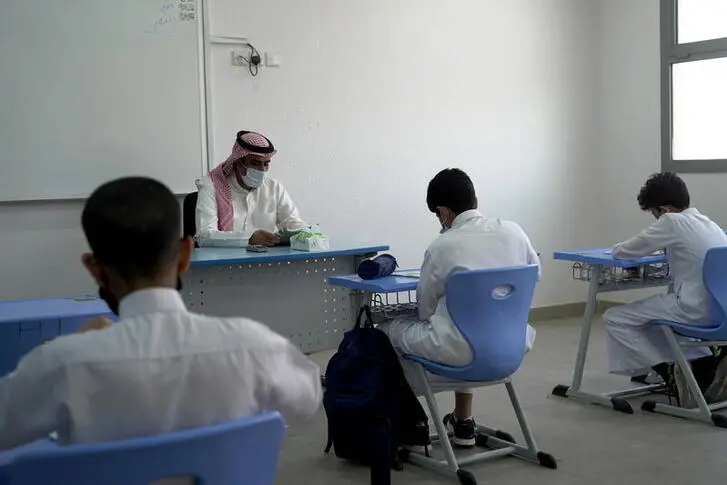PHOTO
RIYADH — The Public Health Authority (Weqaya) emphasized that a total of 11 categories of students, who suffer from various diseases and disorders, have been exempted from attending in-person classes of elementary schools and kindergartens, scheduled to resume on coming Sunday, Jan. 23.
This regulation is part of the directives contained in the guide issued by Weqaya for the return of students under the age of 12 to elementary schools and kindergartens.
According to the guidelines, school canteens and morning assemblies would remain suspended. Boy and girl students shall proceed to their classes directly. All class activities that fail to meet the physical distancing measures shall be canceled.
Sports events and activities shall be conducted in spacious and well-ventilated places, taking into account of the distance without sharing any sport tools and equipment. There should be social distancing while performing prayer at prayer areas as well as at places for ablution.
There should be well-arranged entry and exit of boy and girl students with a physical distancing of 1.5 meters between two students. Only those who wear mask will be allowed entry.
There should be good ventilation for classrooms, opening windows, and benefiting from natural ventilation, in addition to ventilation of air-conditioning devices.
The guide allows teachers to use medical face shield inside the classroom so that their pronunciation of letters will be clear. Teachers have to clean and sterilize the face shield appropriately when taking it off.
They have to wear mask outside the classroom. Sharing meals and group meals in teachers’ rooms and relaxation rooms will not be allowed. There is also no permission to use water coolers.
According to the guidelines, there should be minimum 60 cm spacing between tables of students. There should be different times of intervals for students and timings of their departure from school so as to avoid mixing and crowding.
The guidelines also stipulate that there should be separate square designated for gathering of students of each class. Distribution of meals and eating in classrooms will be allowed.
The guide has identified 11 categories of students exempted from attending in-person classes on health grounds. These categories include students who are suffering from type 1 diabetes; obesity and underweight with body mass index percentile value more than 95 and less than 5; congenital cardiovascular diseases (septal abnormalities, aortic stenosis, pulmonary valve stenosis, transposition of the great arteries, and impaired heart development).
The category includes those with chronic lung disease (chronic asthma, cystic fibrosis and ciliary dyskinesia); chronic kidney disease; neuromuscular dystrophies; anemia (thalassemia and sickle cell anemia); immune-related diseases (acquired immunodeficiency, organ transplants, immunosuppressive therapies and cancer treatment); and genetic diseases (Down syndrome).
Any children with siblings who have these high risk factors caused by such diseases, or children who have siblings or parents who are exempted from receiving coronavirus vaccines due to health problems such as hypersensitivity to coronavirus vaccines are also exempted from attending in-person classes.
© Copyright 2022 The Saudi Gazette. All Rights Reserved. Provided by SyndiGate Media Inc. (Syndigate.info).





















